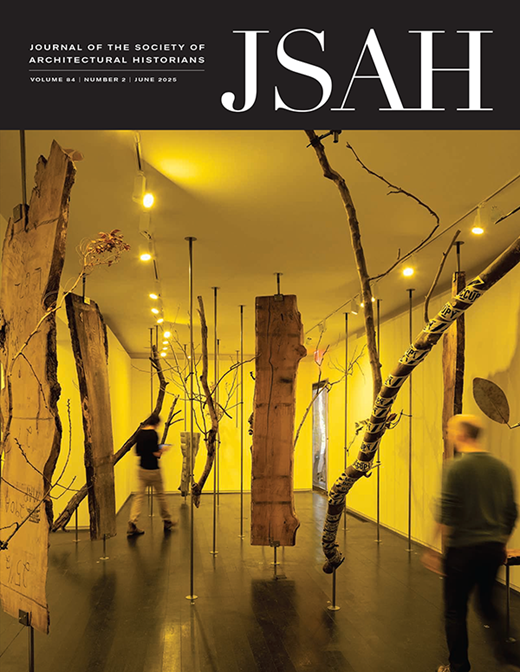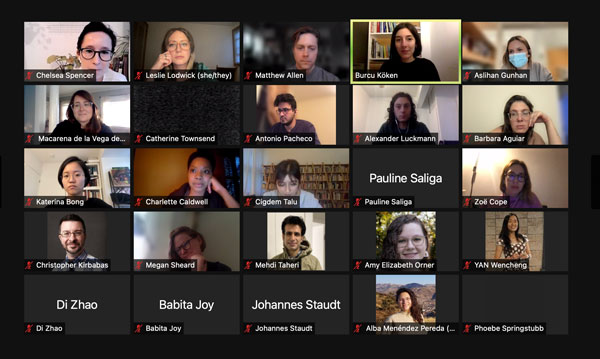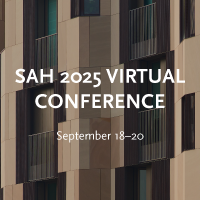-
Membership
Membership
Anyone with an interest in the history of the built environment is welcome to join the Society of Architectural Historians -
Conferences
Conferences
SAH Annual International Conferences bring members together for scholarly exchange and networking -
Publications
Publications
Through print and digital publications, SAH documents the history of the built environment and disseminates scholarshipLatest Issue:

-
Programs
Programs
SAH promotes meaningful engagement with the history of the built environment through its programsMember Programs
-
Jobs & Opportunities
Jobs & Opportunities
SAH provides resources, fellowships, and grants to help further your career and professional life -
Support
Support
We invite you to support the educational mission of SAH by making a gift, becoming a member, or volunteering -
About
About
SAH promotes the study, interpretation, and conservation of the built environment worldwide for the benefit of all
Method Acts: Graduate Student-Led Workshops on Recent Approaches to Methodology
Mar 8, 2022
by
Leslie Lodwick, Antonio Pacheco, Katerina Bong, Charlette Caldwell and Aslihan Gunhan
Seeing the need for continued conversation extending from last year’s successful Method Acts series, the organizers of the 2021–2022 workshop series aimed to continue to explore the constellation of issues framing this call for expansive attention to architectural methodologies. Issues of power, agency, and authorship framed this year’s series while continuing the much-needed conversation on bias, exclusion, and accessibility brought forward by last year's workshops. This year’s events were organized by our 2022 Graduate Student Advisory Committee consisting of Leslie Lodwick, Charlette Caldwell, Katerina Bong, Antonio Pacheco, and Aslıhan Günhan.

Screen shot of Method Acts workshop "Questions of Archives and Resources"
We wondered how this generation of scholars would learn to navigate shifting global frameworks as well as how shifting guidelines on health and safety would affect practical and logistical concerns around conducting research. This lack of sure-footedness seemed to highlight questions about the fundamental nature of knowledge itself and how these are made and known in architectural history, while on seemingly perpetually shifting global platforms. Additionally, we asked what lessons were learned from the last two years of the global pandemic and how we might apply questions gleaned from our contemporary sphere to our own work.
The early career scholars’ research clarified, challenged, and extended these questions in exciting and, at times, unexpected ways through the Method Acts Workshops. The workshops were thematically organized around questions of fieldwork and archives. In the first workshop, fieldwork, Javairia Shahid presented her work on the history of the Calcutta Emigration Camp in the nineteenth and early twentieth centuries constructed via field-related documents; Mingqian Liu addressed phenomenological methods of preservation research in a residential neighborhood, Dongsi, in Beijing; and Abhishek Bhutoria highlighted experimental methods needed to write the history of domestic architecture in Barpak, a Nepali Himalayan village destroyed by the 2015 earthquake. In addition to exemplifying the creativity of architectural methods, these researchers also employed art, stories, imagining, remembering, and song to weave narratives and accounts of the built environment.
In the second workshop organized around questions of the archive, Matthew Allen discussed technologies of architectural software and how they might be understood as frameworks for rethinking periodization; Burcu Köken’s research on the archives of Turkish architectural journal Mimarlık prodded temporal linearity in architectural histories, and Chelsea Spencer proposed a qualitative reading of numbers in construction archives toward reconsidering histories of architectural speculation in defining modernity. All three presenters’ research methodology came together to ask broader questions about assembling fragmented and abstruse information while making it accessible and legible for the general readers. Numbers, software codes, and non-English archives (Turkish) also sparked discussions of translation and interpretation that directly impacted how scholars interacted with these forms of language. Challenging the conventions of archival methodology through Method Acts provided a fruitful discussion and platform for further exploration.
Each presenter shared texts and images central to their work prior to engaging with a direct conversation with workshop participants. Challenging the conventions of methodology through Method Acts provided a fruitful discussion and platform for further exploration of architectural history in the changing global dynamics. While the Covid-19 related lockdown initiated the Method Acts in 2020, we are hoping to continue our conversations on architectural history in an ongoing and global context.


Leave a commentOrder by
Newest on top Oldest on top